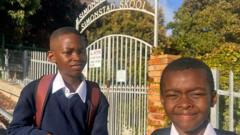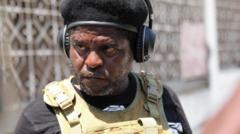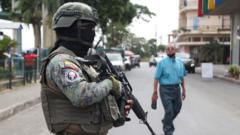In a desperate bid for safety and quality education, parents in Cape Town are increasingly moving their children from struggling township schools to former white-only institutions, driven by fears of crime and a legacy of inequality that persists decades after apartheid's end.
Parents Turn to Former White-Only Schools Amid Safety Concerns in Cape Town

Parents Turn to Former White-Only Schools Amid Safety Concerns in Cape Town
The fear of gang violence and crime in Cape Town's townships is compelling parents to send their children on long commutes to predominantly white schools, highlighting the ongoing impact of apartheid-era inequalities.
The pervasive fear of crime and gang violence in Cape Town's townships is propelling families to make tough decisions regarding their children's education. Many parents are now opting to send their children on extensive daily commutes to former white-only schools, a decision that speaks volumes about the ongoing hardships stemming from decades of apartheid policies.
Sibahle Mbasana, a mother of three, shared her experience with BBC News, revealing the traumatic environment at her sons' former school in Khayelitsha, Cape Town's most populous township. "Thugs would go into the school carrying guns, threatening teachers and stealing laptops right in front of the students," she recounted. The continued absence of adequate security measures leaves both students and educators feeling vulnerable.
The echoes of segregation through the Bantu Education Act of 1953 still ripple through South Africa's education system, with many black students facing unequal opportunities and dangerous conditions. Recognizing the risks, Mrs. Mbasana decided it was imperative to transfer her older son Lifalethu, now 12, and her younger son Anele, 11, to a well-resourced state school located an hour's drive away in Simon's Town. Their younger sister, Buhle, has also joined them there.
Living in Khayelitsha, the Mbasanas find themselves financially constrained, wishing to leave the township. "Speak to anyone in the township, and they'll say they would move out at the first opportunity," Mrs. Mbasana stated.
While there are schools within the townships that strive to excel amid adverse circumstances, safety remains a significant concern for many. Reports from GroundUp highlight teachers at schools like Zanemfundo Primary in Philippi East being extorted by gangs, with safety becoming dire enough to drive some educators toward transfers. The Western Cape Education Department has since begun utilizing private security and increased police presence to counter these threats.
Despite the longer commutes, parents like Mrs. Mbasana see the benefits of better facilities and smaller class sizes at schools like Simon's Town. However, these journeys come with their own risks, as her children leave home at dawn and often return late, exhausted. She recalled a distressing incident when Lifalethu was left stranded after being denied entry onto a bus, raising alarm bells for the family until he was eventually found safe.
The struggles of the Mbasana family resonate with many other parents who grapple with disparities in South Africa's education system. A report by Amnesty International underscores the significant educational inequalities that persist, determining a child’s success based on their background rather than their potential.
With transport costs becoming burdensome, many families are settling for state schools that have shifted their demographic largely to township students, which has resulted in fatigue and performance issues. Class sizes have swelled, and teacher vacancies add to the burden, especially in impoverished areas hit hard by recent budget cutbacks.
Experts note that the educational disparities can be traced back to the fiscal constraints faced by the post-apartheid African National Congress government, hampering the development of a sustainable education system for marginalized communities.
Parents like the Mbasanas find their patience wearing thin; their quest for education and safety reflects a broader struggle against the societal challenges rooted in the legacies of South Africa's past.


















